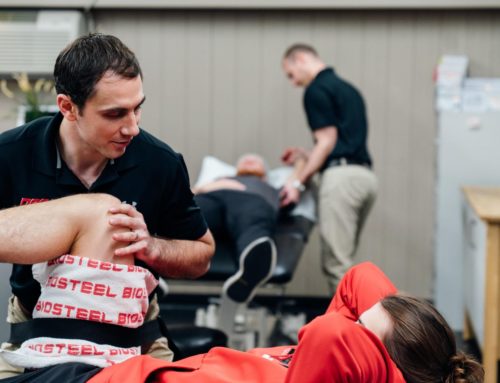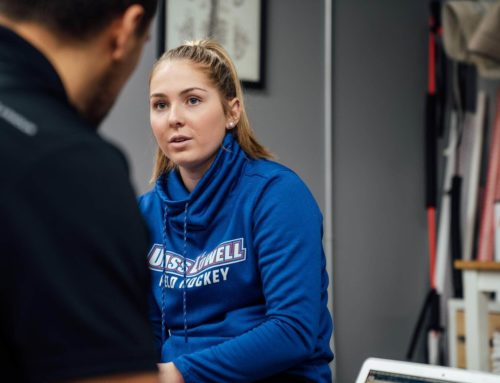When someone talks about a healthy lifestyle, what do you picture? Has that picture changed over the years? Can you see yourself living that way? Have you been working towards the same thing for a long time now? Many people set goals, but they aren’t specific, meaningful, or broken down small enough to make them more doable; such as making daily or weekly habits that can be built upon each other in order to reach the long term end goal.
Life isn’t always easy and can throw curve balls at us. We need to be able to handle these issues, get back on track and be able to stay on track towards our goals. Our daily habits can make a huge impact on how the week, month and year turn out. As Jack Canfield said, “ Good or bad, habits always deliver.” So if you’re habits need an upgrade from bad to good, read below for some simple ways I was able to create good habits for myself, even through some challenging times.
My Background
Throughout my life I have always been very active and athletic, playing on multiple hockey teams each season to be on the ice everyday. This allowed me to eat what I wanted without needing to worry about weight, fat, muscle mass etc. As I transitioned to University learning more about the health, fitness, and nutrition world, I played less hockey and needed to focus more on school and my food intake vs. active output. Throughout the last decade or so I have learnt a wealth of knowledge. I played around with how I should eat for my body type and how much activity I need to do to stay in shape. The biggest fluctuation in my weight and fat gain was after I completed my Master’s Degree. I travelled for a few months, ate what I wanted, and didn’t have any structured workouts, which caused me to gain close to 20 lbs. Once back home, I got on track and lost it all to get back down to my baseline, as I had the knowledge and skill base to do so. However, I know many people don’t have these skills. I have been trying to help as many people as possible to build their knowledge base for fitness and nutrition, to avoid keeping weight on. While training some clients, I have got the comment that I don’t understand the struggle of being obese or needing to work hard to lose weight. Although I have never been classified as ‘obese’, I have dealt with ups and downs with my weight and health. I understand that any ‘weight loss’ journey can be tough. I have worked with a wide range of clients and it can be quite challenging to lose the last few pounds of fat compared to someone starting out who has 30+ pounds to lose. We all have our own journey and I am hoping to point out some similar habits and skills that everyone can learn to help you reach your goals.
Over the last few years I have had many changes and challenges in my life, as everyone does, but some years can be harder than others. I think I have made it through a rough patch and glad to have come out on the other side happy, healthy, and stronger mentally, physically, and emotionally. Here is a list of some of the big things I had to deal with over the last few years:
- Long term relationship break up
- Living fully on my own for the first time
- Trying to meet new friends and create a life in a new area
- Two shoulder injuries (same side twice)
- Supporting multiple friends through depression (while feeling like I should be able to help them more)
- Dealing with family stress and feeling shutout (I am the only one who moved away from the home town)
- Going to therapy (to learn how to take care of myself more than others)
- Switching jobs and taking on more responsibility
- Trying to continuously learn to improve my career and help each client
- Trying to date again (ended up finding a good one J)
- Moving to a house (from a very crappy apartment)
- Buying an income property
During these challenges and changes, it could have been very easy at the start to just give up, move back home, not workout, eat like crap, and let life overwhelm me. However, I was able to slowly work on each issue above and build small habits on top of each other in order to conquer and move forward. It’s important to learn how to really budget our time and not neglect our health and fitness when things are tough. Here are some of the basic habits that I implemented in order to stay on track:
Daily Habits
- Go for a walk (ideally outside with some sun)
- Read/listen to podcast/learn something new (very important for growth)
- Take supplements and vitamins
- Go to bed by 9pm and get a minimum of 7 hours of quality sleep
- Drink a minimum of 2L of water
- Enjoy some ME time. (Do something that makes you happy, that’s only for you, for at least 10 minutes a day enjoy a coffee in silence, meditation, listen to music, watch a show, a relaxing bath etc.)
- Communicate openly (co-workers, friends, family, significant other etc.)
- Eating 3 balanced meals with Protein, Fats, Vegetables and Carbohydrates
- Taking 3 deep breathes when feeling stressed
- Being honest: friends, family, co-workers, and yourself! (even when it’s hard)
- Have positive thoughts (if negative, identify and reframe)
- Organize my tasks for the next day
Weekly Habits
- Minimum 2 workouts plus fun activities (hikes, hockey, rock climb, bike rides etc.)
- Meal planning and prepping food minimum once a week
- Friend or family time (ideally in person)
- Reflection – how did the week go and how can next week be better
- Limiting alcohol: most weeks none and 4 or less at events
These lists are not complete, but they do give you an idea of some good habits to include in your life. You might have other habits that are more realistic to you and your goals. I found these habits extra important because in my career, I am always thinking about my clients and other people before myself. This can be a slippery slope and I have seen it in other people many times. Like the busy mom for example, she takes care of the whole family and forgets about herself, or the dad who spends more hours at work trying to provide for the family, but missing out on actual family time. I knew I didn’t want to be like that and had to make some changes NOW before it got to that level. If I didn’t take care of myself properly, I wouldn’t be a very good coach. I needed to make sure I could practice what I preach!
There are also a few things that are intentionally not included on my habits, such as daily or weekly weigh ins. Yes it is good to know where you are at, however obsessing over numbers can cause more stress. Focus on the good habits to keep weight down and check in occasionally. It’s also important to not just use the scale as your body is made up of many different materials such as bones, ligaments, muscles, fat, hair, water etc. So knowing whether your body is 40% fat vs. 20% fat is a huge deal. That’s why using DEPTH’s Styku Scanner can be so beneficial; it shows you your body fat, fat-free mass, and inches measured throughout your whole body. The first graph below is showing my body weight and the second is showing inches lost over the last 5 weigh ins.
Body weight was on a steady decline, but then it actually went up for the last two weigh ins. Most people would be very upset and scrap what they were doing and go back to some bad habits because it appears it’s not working anymore. But is that the full story? How can the inches go down but weight goes up? If you look at the two graphs below I lost fat and gained muscle. This is why focusing on just the number on the scale can be a big mistake for people, you don’t know if it’s fat or muscle. It’s important to keep muscle mass up for overall health, especially as we age. The more muscle mass you have on your body, the more it will burn off fat just sitting around! My body fat percentage went down about 4% in about 7 months, a general guideline to lose 1% body fat in one month would be a very good result. Our body doesn’t want to lose fat once we have it on, so be patient and trust the process of building good habits. The more body fat you have to start, the easier it can come off at the start, but the process can get harder and harder as you get closer to your end goal. You may need to change your workouts or eating habits to hit that next level because your body is very smart and will start to plateau to try and stay the same.
It’s important to remember that health, fitness, and nutrition is not an end goal either, it is a lifestyle. Once you reach your goal, you will need to continue with those healthy habits in order to maintain or set a new goal to get to the next level. The good thing about reaching your goals through this habit based method is that you won’t feel like you are restricted or always on a diet, you are building a better and more realistic way to living a healthy lifestyle.
Another key point to think about is that you don’t want to aim for perfection, but to be better than you were yesterday. Whether that’s picking fruit over candy, swapping a Bubbly in for a pop, taking a walk at lunch instead of sitting at your desk, eating another serving of vegetables, the options are endless and each small change will add up to give you a better result in the end.
With all the above information you can see how even someone in the health and fitness field needs to stay on track, be aware of what’s happening, keep up with good daily habits, continuously learn and improve. We are all human, dealing with many different stressors or challenges on a daily basis. So that’s why it’s understandable how the average person can find these topics and numbers overwhelming without guidance. If you would like to start on your healthy lifestyle path or if you’re looking for ways to get to the next level, you can book a nutrition or training session with myself by emailing [email protected] I look forward to and enjoy helping a wide range of people, whether you are a beginner or you have been working on yourself for a while, there is always a next step!
Written by: Kerri Brown, Certified Trainer & Nutrition Coach










